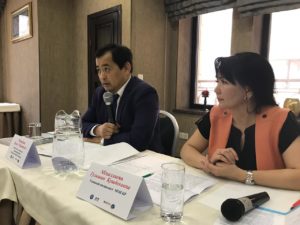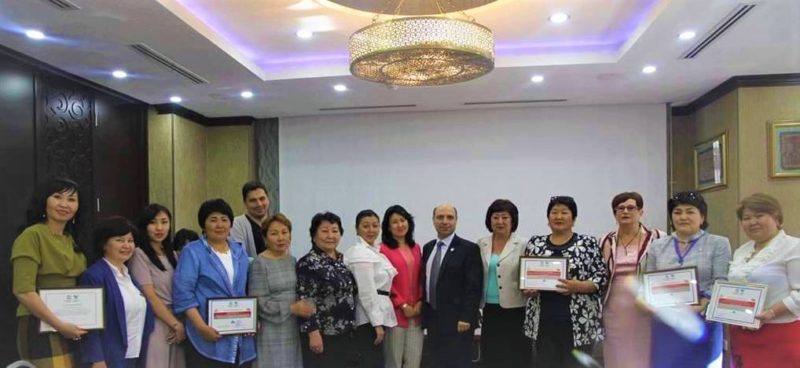On May 13, 2019 in Bishkek, representatives of the Ministry of Education and the Ministry of Health of the Kyrgyz Republic, leaders and employees of educational institutions of Bishkek, Osh, Jalal-Abad and other cities, together with representatives of UNESCO and UNAIDS, reviewed the preliminary results and discussed the work plans regarding preparation of school teachers for running Health Education lessons.
 At the opening Deputy Minister of Health of the Kyrgyz Republic Erkin Checheybayev highlighted the special role school system plays in shaping a healthy lifestyle culture among younger generation. Then, Samira Soltongeldieva, Executive Secretary of the National Commission of the Kyrgyz Republic for UNESCO, addressed the meeting participants with a welcome speech. Gulshan Abdyldaeva, Chief Specialist of the Department of School Education of the Ministry of Education and Science, emphasized that the Ministry sees development of Health Education lessons as one of the priority areas of work.
At the opening Deputy Minister of Health of the Kyrgyz Republic Erkin Checheybayev highlighted the special role school system plays in shaping a healthy lifestyle culture among younger generation. Then, Samira Soltongeldieva, Executive Secretary of the National Commission of the Kyrgyz Republic for UNESCO, addressed the meeting participants with a welcome speech. Gulshan Abdyldaeva, Chief Specialist of the Department of School Education of the Ministry of Education and Science, emphasized that the Ministry sees development of Health Education lessons as one of the priority areas of work.
These classes were first introduced into school practice in 2014. However, large-scale training of teachers had begun three years later due to a joint initiative of the UNESCO Institute for Information Technologies in Education (IITE) and the Joint United Nations Program on HIV / AIDS (UNAIDS). The Ministry of Education and Science of the Kyrgyz Republic supported the project and the Kyrgyz State University n.a. I.Arabaev was chosen as the implementing partner.
Rano Kutanova, the project coordinator and Head of the Scientific and Administrative Department of KSU n.a. I.Arabaev briefed the project participants on preliminary results. “In two years, we managed to train more than 400 teachers in 135 schools across Osh, Jalal-Abad, Kara-Suu, Naryn, Karakol, Cholpon-Ata and Balykchi,” said Ms. Kutanova. All teachers who attended the training received methodological manuals “Health Education classes” in Kyrgyz and Russian languages.
Thanks to the seminars conducted by national experts on Health Education – Valentina Gorkina, Vera Savochkina and Zhamilya Usupova -schoolteachers mastered the skills of running interactive Health Education classes and significantly improved their knowledge of the topic. Meerim Sarybayeva, Country Director of UNAIDS, stressed the importance of discussing the issues related to sexual behavior, reproductive health and HIV prevention within the Health Education classes.

“After these seminars, many teachers began to run Health Education classes with greater enthusiasm, using the manuals they received. The manuals are very helpful, they clearly and specifically instruct on how to discuss each topics from 6th to 11th grade “,
Toktokan Mamyrova, Head of Laboratory, Issyk-Kul Regional Institute of Education.
Vera Savochkina spoke about the translation and adaptation of the educational videos in Kyrgyz language and how they were supposed to be used in Health Education lessons. “These videos help teachers in discussing difficult topics: in a few minutes time they clearly explain the essence of the issue and enable students to make conclusions themselves,” said Ms. Savochkina.
Regional coordinators shared the experience of schools of their regions in organizing Health Education classes and other events on healthy lifestyle promotion. Valentina Gorkina presented the results of monitoring health education classes and student surveys: 757 young people in grades 9-11 (382 girls and 375 boys) filled in two questionnaires “What do I know about health, my development and relationships?” and “What do I know about HIV and AIDS?”. The students who had regular classes on Health Education gave 30% more correct answers to the questions than those who did not have such classes. Taking into account the results of the survey, the Ministry of Education and Science of Kyrgyzstan issued an order on the mandatory classes (class hours) on Health Education in all schools of the country and annual monitoring of students’ knowledge of healthy lifestyle and HIV.
In conclusion of the meeting, Tigran Yepoyan, UNESCO Regional Adviser on HIV and Health Education, outlined further plans for the training of schoolteachers. By the end of June, more than 80 teachers of Bishkek schools will be trained on how to run classes on healthy lifestyle, and in the fall of 2019 seminars will begin for teachers in Batken, Talas, Tokmak and Kara-Balta.
Tigran Yepoyan thanked the Ministry of Education and Science, the Ministry of Health, the National Commission of the Kyrgyz Republic for UNESCO and the UNAIDS office for supporting the project. He also presented the diploma of cooperation to the Vice-Rector of KSU n.a. I.Arabaev and letters of appreciation to the project coordinator Rano Kutanova, regional coordinators and national specialists on Health Education – Valentina Gorkina, Vera Savochkina and Zhamila Usupova.
